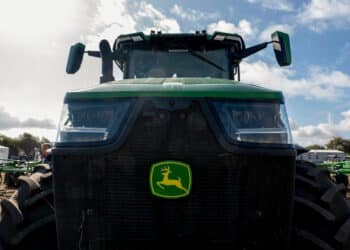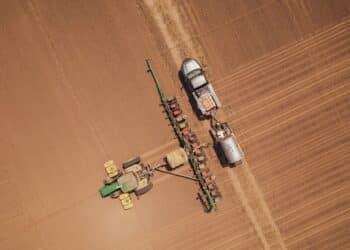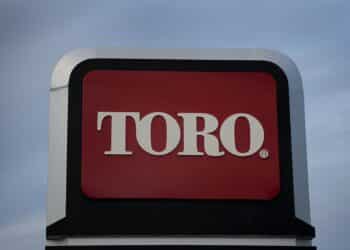OEMs dial in to deliver returns on autonomous, EV equipment
Uncertain resale values pose financing challenges with costs at least 40% more
OEMs are using consumer feedback, advanced data and flexible financing to maximize return on investment for autonomous and electric machinery.
Major players including John Deere, Kubota, Caterpillar and CNH Industrial have unveiled autonomous and electric equipment in recent years to address labor shortages and meet sustainability goals.
But with considerably higher upfront costs, adoption remains limited as consumers question the financial viability. For instance, the average price of an autonomous crop duster is about 43% more than a conventional model, according to online database ResearchGate. Electric machinery, meanwhile, typically costs 40% to 100% more than diesel equivalents, according to technology research firm IDTechEx.
In addition, depreciation uncertainty creates financing challenges for these types of equipment.
To ease concerns over high initial investments, OEMs must be diligent in the development process, gathering user feedback before going to market, Brett McMickell, chief technology officer at heavy-equipment manufacturer Kubota North America, told Equipment Finance News. Kubota created a fully autonomous and electric concept tractor last year for this purpose.
“We tested it out in the field and immediately got feedback from our customers,” he said. “And they’re like, ‘Hey, we use the utility tractor for many different tasks. … You guys have no cab on this thing. There’s no way you can autonomize everything that we need to do. This concept needs work.’ So, immediately we went back. … We put a cab on it, so it has the ability to go fully autonomous, or you can take over manually.”

User feedback also allows OEMs to focus on technology features that are geared toward specific solutions that maximize ROI, McMickell said.
Leveraging data
With EV and autonomous equipment being relatively new, there is limited data available to businesses considering a purchase.
Thus, data collection is crucial for OEMs, McMickell said, noting that Kubota’s acquisition of Bloomfield Robotics last year bolstered this process. Bloomfield’s advanced camera and data processing systems allow farmers to assess crops in real time and make more accurate projections and yield estimates
“They can look at quality metrics, like size and coloration,” he said. “Now, you’ve gone through and digitized your farm. You have an understanding of what that world looks like in a digital format. Now, you can apply artificial intelligence and deploy your autonomy in a very thoughtful way to do something relevant.”
Embedding an AI-driven data collection platform into the machine is another way to maximize value for end-users, Saurabh Gupta, chief product officer at Livermore, Calif.-based Monarch Tractor, told EFN. The company makes fully autonomous and electric tractors.
“While there are a lot of companies with autonomous prototypes, no one has been able to deliver effective value at scale,” he said. “At Monarch, we solve this by using data. … As [our tractors] are used, they are collecting data that not only trains our algorithms but also helps identify the frequent repetitive tasks which provide the highest value for autonomy.”
Financing models take shape
Unpredictable depreciation curves pose challenges to lenders when determining loan terms for high-tech new equipment. Until residual values become clearer, leasing may be the preferred financing method, Kubota’s McMickell said.
“As you look at some of these new technologies, we’re really looking at different ways to engage with the customer in order to help them overcome some of their concerns and also help share the risk,” he said. “Leasing the technology helps hedge that risk a little bit.”
Subscription-based software financing could also become popular, he said.
Lenders that provide traditional retail financing for electric equipment should consider “not only the higher costs and customers’ ability to pay, but also evaluate the dependability and longevity of the equipment’s useful life,” Jody Ray, relationship manager at Chicago-based BMO Bank North America, told EFN.
“We want to assist all of our clients as they implement climate-friendly equipment while continually measuring and mitigating risk,” he said.
Early-bird pricing for the third annual Equipment Finance Connect ends March 28. Taking place at the JW Marriott Nashville on May 14-15, 2025, this is the only event for both equipment dealers and finance providers. Learn more and register here.









